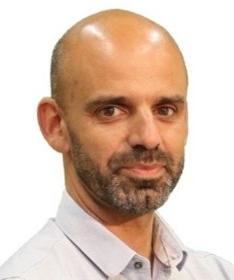Associate Pr. Pedro Barquinha
Group Leader of Materials for Electronics, Optoelectronics and Nanotechnology, CENIMAT|i3N
CENIMAT/i3N, Department of Materials Science, NOVA School of Science and Technology (FCT-NOVA) and CEMOP/UNINOVA, NOVA University Lisbon, Campus de Caparica, 2829-516 Caparica, Portugal
Abstract
With the current constraints on assuring supply of microelectronic chips and on technological/ physical limitations to further miniaturize existing Si-based transistors, the world is looking for alternative approaches to revolutionize electronics. Thin-film transistors (TFTs) have been fueling flat panel display industry for the last 3 decades, and with oxide semiconductors enabling a combination of good electrical performance, low-temperature/large area fabrication and even optical transparency, academics and industry are pushing the boundaries for these devices and taking them to applications beyond displays. Indeed, oxide TFTs are now finding their application space in multiple domains: from low-transistor count flexible circuits that can be seamlessly embedded into everyday objects, to high-density circuits with sub-10 nm gate lengths, where arguments such as compatibility with non-planar device structures (e.g., gate-all-around) and extremely low off-currents turn the technology very appealing for a new wave of electronic applications, where sustainability and high-performance can mutually exist.
For the last two decades, Materials Research Center at NOVA School of Science and Technology (CENIMAT, FCT-NOVA) has been exploring oxide semiconductors and taking them toward flexible TFT and circuit integration, always making use of sustainable materials and large-area scalable processes. This presentation will thus cover an overview of flexible electronics and multiple application concepts being explored at CENIMAT with oxide TFTs, such as multifunctional electronic textiles, targeting revolutionary applications on smart homes and IoT, energy management circuits to deploy energetically self-sustainable platforms in remote locations, and flexible ionizing radiation detectors, targeting uses in radiotherapy or even aerospace environment.
Short Bio/CV
Pedro Barquinha received his PhD in Nanotechnologies and Nanosciences from NOVA University Lisbon in 2010. He is an Associate Professor at the Materials Science Department of FCT-NOVA and group leader of Materials for Electronics, Optoelectronics and Nanotechnology at Materials Research Center (CENIMAT|I3N). He has 20+ years experience in multiple fields within low-temperature electronics, from materials to circuit integration. This has been achieved through >45 research projects with academia and industry, including an ERC Starting Grant (TREND) and an ERC Proof of Concept Grant (FLETRAD). Pedro co-authored 170+ peer-reviewed papers (h-index=57, as November 2023), 3 books and 7 book chapters and is an editor at IEEE EDL and IEEE JFLEX. Since 2022 he is a member of the Portuguese Council for Science, Technology and Innovation and also a member of the International Iberian Nanotechnology Laboratory (INL) council.



